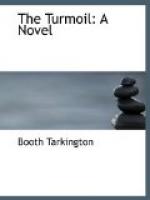They got it. From all the states the people came; thinly at first, and slowly, but faster and faster in thicker and thicker swarms as the quick years went by. White people came, and black people and brown people and yellow people; the negroes came from the South by the thousands and thousands, multiplying by other thousands and thousands faster than they could die. From the four quarters of the earth the people came, the broken and the unbroken, the tame and the wild— Germans, Irish, Italians, Hungarians, Scotch, Welsh, English, French, Swiss, Swedes, Norwegians, Greeks, Poles, Russian Jews, Dalmatians, Armenians, Rumanians, Servians, Persians, Syrians, Japanese, Chinese, Turks, and every hybrid that these could propagate. And if there were no Eskimos nor Patagonians, what other human strain that earth might furnish failed to swim and bubble in this crucible?
With Bigness came the new machinery and the rush; the streets began to roar and rattle, the houses to tremble; the pavements were worn under the tread of hurrying multitudes. The old, leisurely, quizzical look of the faces was lost in something harder and warier; and a cockney type began to emerge discernibly—a cynical young mongrel barbaric of feature, muscular and cunning; dressed in good fabrics fashioned apparently in imitation of the sketches drawn by newspaper comedians. The female of his kind came with him—a pale girl, shoddy and a little rouged; and they communicated in a nasal argot, mainly insolences and elisions. Nay, the common speech of the people showed change: in place of the old midland vernacular, irregular but clean, and not unwholesomely drawling, a jerky dialect of coined metaphors began to be heard, held together by GUNNAS and GOTTAS and much fostered by the public journals.
The city piled itself high in the center, tower on tower for a nucleus, and spread itself out over the plain, mile after mile; and in its vitals, like benevolent bacilli contending with malevolent in the body of a man, missions and refuges offered what resistance they might to the saloons and all the hells that cities house and shelter. Temptation and ruin were ready commodities on the market for purchase by the venturesome; highwaymen walked the streets at night and sometimes killed; snatching thieves were busy everywhere in the dusk; while house-breakers were a common apprehension and frequent reality. Life itself was somewhat safer from intentional destruction than it was in medieval Rome during a faction war—though the Roman murderer was more like to pay for his deed—but death or mutilation beneath the wheels lay in ambush at every crossing.




